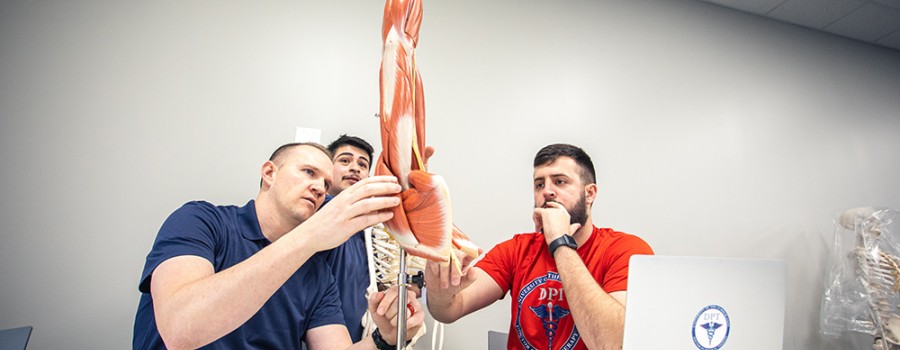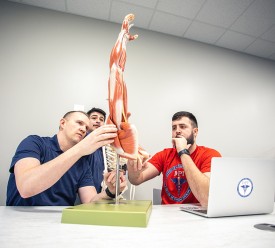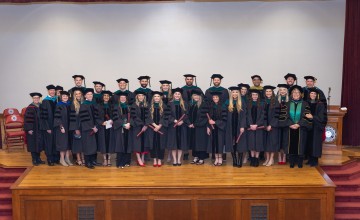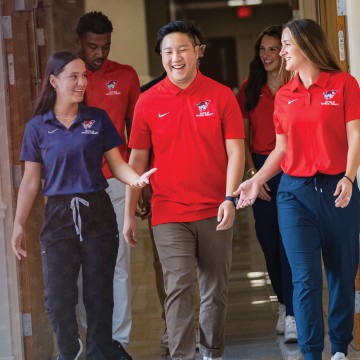Healing an injury changes a life.
We don’t just train “good” physical therapists – we prepare exceptional physical therapy professionals. The Connie D. Hauser Doctor of Physical Therapy (DPT) Program at University of the Cumberlands delivers a dynamic, case-based curriculum that blends academic rigor with practical experience. Our Doctor of Physical Therapy degree program is structured to be completed in just six consecutive semesters, allowing you to earn your DPT in 24 months. Through a mix of self-guided online coursework, interactive live classes in a virtual classroom, and on-campus training, you’ll build the expertise needed to excel in today’s healthcare field.
The DPT program curriculum emphasizes immersive learning, clinical education, and hands-on experiences in diverse practice settings. With clinical partnerships at more than 200 organizations across the United States, students gain extensive opportunities to apply their skills and prepare for rewarding careers in physical therapy. Whether your goal is to serve in hospitals, outpatient clinics, rehabilitation centers, or other healthcare environments, Cumberlands’ Doctor of Physical Therapy program equips you with the knowledge and confidence to become a leader in the profession.
Want to learn more about our program? Register for one of our live information sessions!
REGISTER
By the Numbers
Programs & Requirements
The Connie D. Hauser Doctor of Physical Therapy (DPT) Program is a professional graduate program with a dynamic curriculum that includes courses in anatomy, physiology, biomechanics, neuroscience, and social psychology, among others. As a student in this physical therapy education program, you will engage in self-guided online coursework, live classes in a virtual classroom, and hands-on training on campus. The DPT program curriculum includes didactic (book-learning) coursework, immersive experiences, clinical education, and practical training in various practice settings. In just two years of full-time classes, you could learn everything you need to know to become a licensed Doctor of Physical Therapy.
By completing your Doctor of Physical Therapy program at Cumberlands, you will be prepared for a rewarding career as a licensed physical therapist. The comprehensive coursework and hands-on training you receive will give you the knowledge and skills necessary to help physical therapy patients improve their mobility, manage pain, and enhance their overall well-being.
Course Requirements
First Bi-Term
- DPT 710 - Professional Formation 1
- DPT 741 - Physical Therapy Fundamentals
- DPT 713 - Evidence Informed Practice 1
- Immersion 1 Weeks 7-8 ( 9 days)
Second Bi-Term
- DPT 712 - Communication for Healthcare Professionals
- DPT 742 - Introduction to Patient Examination
- DPT 718 - Integrated Case Studies 1
- Immersion 2 Weeks 15-16 ( 12 days)
Main Term
First Bi-Term
- DPT 743 - Musculoskeletal Physical Therapy Practice 1
- DPT 734 - Principles of Health Promotion for Physical Therapists
- DPT 735 - Clinical Biomechanics
- Immersion 3 Weeks 7-8 ( 13 days)
Second Bi-Term
- DPT 744 - Musculoskeletal Physical Therapy Practice 2
- DPT 737 - Pharmacology for Physical Therapists
- DPT 736 - Biophysical Agents
- Immersion 4 Weeks 15-16 ( 13 days)
Main Term
First Bi-Term
- DPT 820 - Psychosocial Considerations in Health Care
- DPT 843 - Musculoskeletal Physical Therapy Practice 3
- DPT 811 - Evidence Informed Practice 2
- DPT 834 - Integrated Principles of Exercise Science in Physical Therapy Practice
- Immersion 5 Weeks 7-8 (13 days)
Second Bi-Term
- DPT 823 - Prosthetics, Orthotics, and Assistive Technologies
- DPT 818 - Integrated Case Studies 3
- DPT 810 - Professional Formation 2
- Immersion 6 Weeks 15-16 ( 13 days)
Main Term
First Bi-Term
- DPT 813 - Clinical Imaging in Physical Therapy
- DPT 832 - Physical Therapy Practice Across the Lifespan 2
- DPT 842 - Physical Therapy Practice Across the Lifespan 1
- DPT 844 - Musculoskeletal Physical Therapy Practice 4
- Immersion 7 Weeks 7-8 ( 14 days)
Second Bi-Term
Main Term
First Bi-Term
- DPT 950 - Management of Patients with Complex Conditions and Primary Care
- DPT 930 - Integumentary Physical Therapy
- DPT 931 - Management and Leadership in Physical Therapy
- DPT 918 - Integrated Case Studies 4
- Immersion 8 Weeks 7-8 ( 13 days)
Second Bi-Term
Clinical Education is a critical component of the DPT curriculum, providing students opportunity to practically apply classroom instruction and to develop their clinical and patient care skills under the supervision of licensed physical therapist practitioners. Our DPT students participate in a clinical education curriculum that includes both integrated and full-time clinical experiences that offers both breadth and depth to their clinical learning.
Full-Time Clinical Experiences
In the second year of the DPT program, students complete three clinical experiences in clinical sites around the country. These clinical experiences include two 8-week experiences and a 15-week terminal experience. The 15-week terminal experience occurs after the completion of all didactic coursework, and students develop the skills and abilities needed to practice as an excellent, entry-level clinician. All students are required to complete experiences that provide experiences across patient populations.
All clinical experience sites are selected and approved by the Director of Clinical Education (DCE). The establishment of new affiliation agreements will be considered by the DCE only when the clinical site meets the specific requirements and needs of the DPT program and offers a learning environment consistent with the University of the Cumberlands DPT’s mission.
Take the Next Step
Admission Information
Admission Requirements for DPT Program
The Doctor of Physical Therapy Program considers for admission those students who possess the academic and professional promise necessary for development as competent, caring members of the healthcare community. The Doctor of Physical Therapy Program is open on a competitive basis to applicants having met admissions requirements. A competitive admissions framework, involving multiple criteria are used to select the most qualified candidates.
This holistic admissions process considers academic and non-academic criteria. Some of the non-academic criteria that are given special admissions considerations are: geographic (rural, medically underserved) and/or economic background, first generation graduate student, history of service/leadership, and record of military service.
Our program will put the emphasis on the student in the classroom with cohorts of only 30 students for each class.
Click HERE to view the admission requirements for the University of the Cumberlands' DPT program.
Official Transcript Information: In accordance with University of the Cumberlands admissions policies and procedures, those students selected for admission to the DPT program are required to submit official transcripts from all colleges/universities previously attended. These transcripts must be received directly from the college/university. Student-submitted copies are not acceptable. Official transcripts should be submitted through the Physical Therapy Centralized Application Service (PTCAS). Transcripts must be received prior to the scheduled class matriculation date or class standing will be revoked. Failure to submit the mandatory transcripts or fulfill any other requirements specified in a conditional offer of admission to the program, prior to the scheduled class matriculation will result in withdrawal of the conditional offer. Any official transcripts that are not in the PTCAS portal must be mailed directly to:
Graduate Admissions Office
649 S. 10th Street Suite C
Williamsburg, KY 40769
Phone: 606.539.4390
Toll-free: 855.791.7199
Email: gradadm [at] ucumberlands.edu (gradadm[at]ucumberlands[dot]edu)
Transfer and Course Credit Policy: No transfer credit will be accepted for courses from other DPT programs.
DPT Prerequisites - Academic & Other
To qualify for the program, you must meet or exceed the following criteria:
Earn a bachelor’s degree from a regionally accredited college or university, with a cumulative grade point average (GPA) of 2.75 or higher on a 4.0 scale.
Successfully complete the following prerequisite courses in biological sciences, physical sciences, behavioral sciences, and statistics. A minimum cumulative GPA for prerequisites of 3.0 or higher on a 4.0 scale is required. Grades of 'C' or better are required in all prerequisite courses. Prerequisite courses taken on a 'pass/no pass' basis will not be recognized, and AP credits will not be accepted in lieu of college-level courses. The Admissions Committee may consider a prerequisite course listed as a 'pass/no pass' if the student can provide official verification of the earned grade from that course for prerequisite GPA calculation. Prerequisite courses must be completed within ten years prior to admission.
- General Biology 1 and 2 with laboratory (6 semester hours or equivalent)
- General Chemistry 1 and 2 with laboratory (6 semester hours or equivalent)
- General Physics 1 and 2 with laboratory (6 semester hours or equivalent)
- Human Anatomy and Physiology 1 and 2 with laboratory (6 semester hours or equivalent)
- Statistics (3 semester hours or equivalent)
- General Psychology (3 semester hours or equivalent)
- A minimum of one 3 semester hour or equivalent writing intensive course in humanities or social sciences
- Completion of a medical terminology course – this can be completed for credit at a college or university or proof of completion of an online certification course.
Physical therapy education and practice requires a strong science background. Additional upper-level Biology or Health Science courses (embryology, advanced physiology, genetics, etc.) are recommended.
Complete twenty hours (20) of observation or employment in a physical therapy setting under the supervision of a licensed physical therapist and verified by the physical therapist. The purpose of observation hours is to help the applicant develop a basic understanding/knowledge of the PT profession before committing to the rigorous process of obtaining a Doctor of Physical Therapy degree. Observation hours may be completed in outpatient and/or inpatient settings.
Submit three letters of reference from professionals who are familiar with your personal and professional characteristics and can best address your potential for success in the DPT program. One letter should come from a college/university faculty member or advisor: one from a licensed physical therapist, and one from an employer or an advisor for an organization.
Demonstrate English Fluency. All applicants for whom English is not their first language, or those who completed a bachelor’s degree and prerequisites from a college or university in a foreign country, must achieve satisfactory scores on the Test of English as a Foreign Language (TOEFL) or the International English Language Testing System (IELTS), or complete an approved English as a Second Language (ESL) course with the past five years.
Any international course work completed must have official transcript evaluations completed and submitted to the University by the evaluation firm. Evaluations MUST include GPA for admission.
Approved Evaluation Firms are:
A candidate must have abilities and skills in five areas: : 1) observation, 2) communication, 3) motor/psychomotor, 4) cognitive (intellectual, conceptual, integrative, and quantitative), and 5) behavioral and social. Technological compensation can be made for some limitation in certain of these areas, but a candidate should be able to perform in a reasonably independent manner. For further detail, see tab entitled "Technical Standards" under the header "Admission Requirements" on this webpage.
Candidates are required to certify that they understand and meet program Technical Standards. Candidates must provide such certification prior to matriculation. Candidates who may not meet the Technical Standards must inform the Director of Admissions, who will then contact the Dean of Students. The Dean of Students, in consultation with the academic dean (and program director), will identify and discuss what accommodations, if any, the College(/Program) would need to make that would allow the candidate to complete the curriculum. The College(/Program) is not able to grant accommodations that alter the educational standards of the curriculum. Students must meet the Technical Standards for the duration of enrollment in their professional program.
Application & Interview Process
PTCAS applications are now available. The first application cycle for Spring 2026 opens January 17, 2025 and closes June 1, 2025. The second spring 2026 application cycle opens on June 15, 2025 and closes November 1, 2025.
Completed Applications
The Office of Graduate Admissions will send correspondence verifying receipt of PTCAS applications with all required materials to all applicants who meet the minimum cumulative GPA requirement of 2.75. The letters will also include instructions on checking the status of the required application materials online. Applicants are responsible for tracking the receipt of their application materials and ensuring the submission of all required documents. Only applicants who submit completed applications with all required application materials will be considered for potential entrance into the Program.
Please Note: Applicants are responsible for notifying The Office of Graduate Admissions of any changes in their mailing address or email address. All application withdrawal requests must be made in writing via e-mail to: The Office of Graduate Admissions ptadmissions [at] ucumberlands.edu (ptadmissions[at]ucumberlands[dot]edu)
When applicants are considered eligible for interviews after review of their completed admissions files, they are notified of available interview dates and invited by The Office of Graduate Admissions to schedule an online interview. A typical interview involves participation in the following activities which are coordinated by the Office of Graduate Admissions: completion of a writing prompt; a group and an individual interview with at least two interviewers, a virtual tour of the university, an opportunity to meet with an admissions counselor, and a questions and answer session with the faculty. During interview sessions, interviewers question applicants about their academic, personal, and professional aspirations and preparedness for admission to the Program. The interviewer rates prospective students on a standardized evaluation form. The Doctor of Physical Therapy Admissions Committee reviews the full application files for interviewed applicants and then formulates and submits recommendations to the Director of Graduate Admissions. The Office of Graduate Admissions then notifies applicants in writing of an admissions decision.
Technical Standards
The University of the Cumberlands Doctor of Physical Therapy Program is committed to the education of all qualified individuals, including persons with disabilities who, with or without reasonable accommodation, can perform the technical standards and essential functions of the educational program in which they are enrolled and the profession that they pursue.
Technical standards and essential functions for the Doctor of Physical Therapy Program define the observational, communication, cognitive, affective, and physical capabilities and professional responsibilities deemed necessary to complete the program and to perform as a competent practitioner of physical therapy. In accord with federal regulations established by the Americans with Disabilities Act, the technical standards and essential functions are described to assist each candidate for the educational program in evaluating their prospect for academic and clinical success. Each student is given the opportunity to read and acknowledge their understanding of the standards and functions prior to beginning of the program. Students matriculating through the program must be capable of performing the following standards and functions, with or without reasonable accommodations, throughout the professional curriculum, through a continuous evaluation process to determine ongoing proficiency. When a student’s ability to perform is compromised, the student must demonstrate alternative means and/or abilities to perform the technical standards and essential functions described.
Detailed Lists
Students admitted to and matriculating through the University of the Cumberlands Doctor of Physical Therapy Program must be capable of completing the following technical standards and essential functions, with or without reasonable accommodation:
University of the Cumberlands accepts qualified students without regard to disabilities and provides reasonable accommodations in the classroom, housing, food service, or other areas for students with documented disabilities. The University’s obligation to reasonably accommodate any student’s disability ends where the accommodation would pose an undue hardship on the University or where the accommodation in question would fundamentally alter the academic program. For accommodations to be provided, a student must complete an Accommodations Application form (available online at ADA | University of the Cumberlands (ucumberlands.edu)) and provide appropriate documentation of the disability. Documentation should include statements from a qualified professional, stating the disability, how the diagnosis was determined, description of functional limitations and specific accommodation recommendations. Accommodations records from a high school or previously attended educational institution may qualify as appropriate documentation, but supplemental documentation may be requested. Additional information regarding accommodations can be found in the Guidelines for Documentation (available online at ADA | University of the Cumberlands (ucumberlands.edu)).
When all paperwork is on file, a meeting between the student and the Director will be arranged to discuss possible accommodations before accommodations are formally approved. Students must renew academic accommodations at the start of each new term. Certifications for other accommodations are normally reviewed annually. All accommodations may be reviewed at any time at the request of the student or of the Director of Student Accommodations.
It is the policy of the program to comply with the Americans with Disabilities Act, Section 504 of the Rehabilitation Act of 1973, and state and local requirements regarding students and applicants with disabilities. Under these laws, no otherwise qualified and competent individual with a disability shall be denied access to or participation in services, programs, and activities solely on the basis of the disability.
The student is expected to possess functional vision, hearing, smell, and somatic sensations (touch, pain, temperature, and vibration) sufficient to:
- accurately observe and fully participate in academic and healthcare settings.
- accurately and completely observe a patient up close and at a distance to be able to obtain a medical history and perform physical examination procedures.
- safely and effectively administer physical therapy interventions.
Communication includes speech, language, reading, writing and computer literacy. The student is expected to possess skills sufficient to:
- communicate in oral and written English, and in electronic form effectively and in a timely manner in the academic and healthcare settings.
- receive and deliver complex information orally and in writing, and to respond effectively to questions from a variety of sources in the academic and healthcare settings.
- use computers for searching, recording, storing, retrieving, and communicating information.
- engage in respectful, non-judgmental interactions with individuals from various lifestyles, cultures, races, socioeconomic classes, and abilities.
- communicate sensitively, and with a sense of compassion and empathy with all stakeholders in the healthcare and academic settings, such as patients and their family members, caregivers, clinicians, interprofessional team members, payers, policy makers, classmates, faculty, administrative support, and service staff members.
- perceive and interpret non-verbal communication to elicit information such as changes in mood
- receive and send verbal communication in emergency situations in a timely manner.
- effectively educate others using teaching methods that are commensurate with the needs of the learner
Problem solving is a critical skill demanded of physical therapists, and requires conceptual, integrative, and quantitative thinking abilities. The student must be able to:
- to analyze, evaluate, and synthesize detailed and complex information across the cognitive, psychomotor, and affective domains to solve problems and make decisions in an effective and timely manner in the academic and healthcare settings.
- identify, evaluate and integrate the best evidence for practice with clinical judgment and patient/client values, needs, and preferences to determine the best care for a patient.
- comprehend three-dimensional relationships and the spatial and functional relationships of structures, and to analyze and apply this information for problem solving and decision-making.
Students must:
- possess sufficient emotional health and stability required for exercising good judgment and promptly completing all academic and patient care responsibilities.
- possess sufficient interpersonal skills to interact positively with people from all levels of society, ethnic backgrounds, and belief systems.
- possess qualities of adaptability and flexibility and be able to function in an atmosphere of uncertainty.
- be able to self-assess, accept criticism, and assume responsibility for maintaining professional behavior.
- demonstrate concern for others, accountability, integrity, honesty, and ethical behavior.
Physical therapy examination and intervention skills require coordination of gross and fine muscular movements Students must have sufficient motor function
- to carry out gross and fine motor movements necessary for patient care, for movement between facilities and buildings in academic and healthcare environments, and physical stamina to complete demanding didactic and clinical coursework.
- to carry out treatment maneuvers with patients of any size and mobility levels including exercising, lifting, transferring, and assisting during ambulation, and be able to accomplish this while assuring their own safety as well as the safety of the patient.
- perform physical examinations and administer physical therapy interventions on peers and patients of all genders and sexual preferences, races and ethnicities, belief systems, and abilities along with being examined by peers of all genders and sexual preferences, races and ethnicities, and belief systems.
It is each student’s responsibility to travel to and from classes and clinical assignments on and off campus on time and possess the organizational skills and stamina for performing required tasks and assignments within allotted time frames. This involves frequent oral, written, and practical examinations or demonstrations.
Students will:
- take initiative to direct their own learning. They will work cooperatively and collaboratively with other students on assigned projects and participate willingly in a supervisory process involving evaluation of abilities and reasoning skills.
- exhibit adherence to policies (including vaccination policies) of the University, the program, and clinical sites. This includes matters ranging from professional grooming, dress, and behavior, to attending to the program’s academic schedule, which may differ from the University’s academic calendar and be subject to change at any time.
- demonstrate knowledge of, and practice in a manner consistent with the APTA Code of Ethics and the APTA Core Values
- in response to an ethical situation, implement a plan of action that demonstrates sound moral reasoning congruent with core professional ethics and values.
- participate in professional and community organizations that provide opportunities for volunteerism, advocacy, and leadership.
- advocate for the profession and the healthcare needs of society through legislative and political processes.
- identify career development and lifelong learning opportunities, including the role of the physical therapist in the clinical education of physical therapist students.
Students must be capable of performing the following assessments, with or without reasonable accommodations.
Assessment Procedures (including but not limited to)
- Anthropometrical measures (length, girth, and volume)
- Assistive device fit/use
- Balance
- Cardiovascular Endurance
- Cognitive/mental status
- Coordination
- Cranial and peripheral nerve function
- Developmental stage
- Functional abilities
- Gait
- Joint motion/joint play
- Movement patterns
- Muscle tone
- Pain
- Palpation
- Posture
- Pulmonary system
- Reflexes
- Sensation
- Skin integrity
- Soft tissue
- Strength
- Vascular integrity
- Vital signs
- Wound status
Students must be capable of performing the following treatment procedures, with or without reasonable accommodations.
Treatment Procedures (included by not limited to)
- Cardiopulmonary Resuscitation (CPR)
- Balance training
- Exercise techniques
- Gait training
- Transfer training
- Bed mobility training
- Functional training
- Coordination training
- Postural correction
- Prosthetic/orthotic training
- Joint mobilization/manipulation
- Wound care
- Wheelchair prescription and mobility training
- Electrotherapy
- Soft tissue mobilization and massage
- Techniques of neurosensory approaches
- Thermal agents
- Cardiopulmonary rehabilitation
- Developmental activities
- Hydrotherapy
- Recommend architectural adjustments
- Tilt table
- Relaxation techniques
- Postural drainage
- Traction
- Patient education

Mission & Goals
The mission of the program is to provide an innovative career-focused education that nurtures highly skilled Doctors of Physical Therapy.
Program Metrics
DPT Cohort 1 (December 2024): 100%
Cohort of 2024: One-year Ultimate Pass Rate - 73%*; First Time - 46%
*When two years of data are not available, the one-year ultimate pass rate is reported.
The percentage of licensed graduates from the Cohort of 2024 who sought employment and were employed as a physical therapist within one year of graduation: 100%
DPT Careers & Outcomes
All stats from the American Physical Therapy Association.
Physical Therapist: $97,720
Physical Therapist: $97,720
Physical therapists help injured or ill people improve movement and manage pain.
PT Assistant: $62,770
PT Assistant: $62,770
Assist physical therapists in providing physical therapy treatments and procedures. May, in accordance with state laws, assist in the development of treatment plans, carry out routine functions, document the progress of treatment, and modify specific treatments in accordance with patient status and within the scope of treatment plans established by a physical therapist. Generally requires formal training.
Occupational Therapist: $85,570
Occupational Therapist: $85,570
Occupational therapists evaluate and treat people who have injuries, illnesses, or disabilities to help them with vocational, daily living, and other skills that promote independence.
Fitness Trainer: $40,700
Fitness Trainer: $40,700
Fitness trainers and instructors lead, instruct, and motivate individuals or groups in exercise activities.
Exercise Physiologist: $47,940
Exercise Physiologist: $47,940
Exercise physiologists develop fitness and exercise programs that help injured or sick patients recover.
Massage Therapist: $46,910
Massage Therapist: $46,910
Massage therapists treat clients by applying pressure to manipulate the body's soft tissues and joints.
Common Questions
DPT program applicants must have completed a baccalaureate degree prior to matriculation. There is not a required major. Applicants may have majored in any subject as long as they meet the admission requirements including course prerequisites with a satisfactory GPA of 3.0 or higher and a cumulative undergraduate GPA of 2.75 or higher.
Community college courses may or may not fulfill prerequisites – the courses can be reviewed for acceptance and must meet the content, level, and lab requirements.
The Graduate Record Exam (GRE) is not required for consideration for admissions.
The curriculum includes eight on-campus immersions. The number and duration of immersions varies by semester. During these hands-on immersions, you will learn alongside a skilled and caring faculty and a cohort of thirty classmates, applying the knowledge you gained in online education to engage with real patients in supervised community-based service-learning experiences. As part of these immersions, you will participate in formative assessments and feedback on knowledge, skills, and clinical decision making.
Clinical education experiences will be in Kentucky and across the U.S. Students may be expected to travel for clinical education experiences and are responsible for living arrangements and costs associated with clinical education experiences.
Thirty students are accepted to begin as a cohort each January.
The application deadline for each admission cycle is November 1st. An application must be verified in PTCAS by this date to be considered. The program admits one cohort each year in January.
Please note: There are two PTCAS cycles that allow for admission into the next January cohort. The first cycle runs from Jan. 17th – June 1st. The second cycle runs from June 15th – Nov. 1st. Both of these PTCAS cycles are for the same cohort.
Candidates may have their bachelor’s degree and/or prerequisites in progress, as long as both are complete prior to matriculation.
All applicants must apply and follow the PTCAS application guidelines. A University of the Cumberlands supplemental application and $30 application fee are also required. The link to the supplemental application will be provided once your PTCAS application has been verified.
PTCAS Website
We understand that some students, for various reasons, may desire to maintain some level of employment while enrolled in a DPT program with a hybrid-learning format. However, working while enrolled in our full-time accelerated program is not recommended. The academic demands of the accelerated curriculum, time for travel to and from on-campus lab immersions, and full-time clinical education make it very difficult to work and be successful in your didactic and clinical education.
University of the Cumberlands’ Office of Financial Aid helps students plan for and find the financial assistance needed to put their graduate educational goals within reach. Information related to financial aid for graduate students can be found here.
Students taking classes full-time (a minimum of 12 credit hours per semester, 3 semesters per year) can complete this DPT program in 2 years.
Nope – but you will want to live close enough that the in-person training is feasible for you. For more details about on-campus coursework, view the DPT Course Information.
Wages for physical therapists vary by geographic area, but the median pay nationwide is almost $41 per hour, more than $85,000 per year.
(https://www.apta.org/your-career/careers-in-physical-therapy/becoming-a-pt)
Physical therapists evaluate individuals and diagnose movement system dysfunctions. After performing an evaluation, physical therapists create and implement personalized plans of care based on the best available evidence to help their patients improve mobility, manage pain and chronic health conditions, recover from injury, and prevent future injury and chronic disease.
Accreditation
The Connie D. Hauser School of Physical Therapy at The University of the Cumberlands is accredited by the Commission on Accreditation in Physical Therapy Education (CAPTE), 3030 Potomac Ave., Suite 100, Alexandria, Virginia 22305-3085; telephone: 703-706-3245; email: accreditation [at] apta.org (accreditation[at]apta[dot]org); website: http://www.capteonline.org. If needing to contact the program/institution directly, please call 606.539.4251 or email: physicaltherapy [at] ucumberlands.edu (physicaltherapy[at]ucumberlands[dot]edu).
Complaints to the Commission on Accreditation of Physical Therapy Education
The Commission on Accreditation in Physical Therapy Education is a nationally recognized accrediting agency by the U.S. Department of Education and the Council for Higher Education Accreditation. CAPTE grants specialized accreditation status to qualified entry-level education programs for physical therapists and physical therapist assistants. The only mechanism through which CAPTE can act on an individual’s concerns is through a formal complaint process. For more information please visit the CAPTE website.
The process for filing a complaint with CAPTE is available here.
Program Complaint Processes are available here.
Faculty Experts in Physical Therapy
Our faculty are experts in the classroom and in practice.

Dr. Vicki LaFay

Dr. Rajiv Dalal

Dr. Steve Hammons
Program Info Sessions
Join staff from the Doctor of Physical Therapy Program for an info session to learn more about the program and the application process.
Top Physical Therapy Questions!
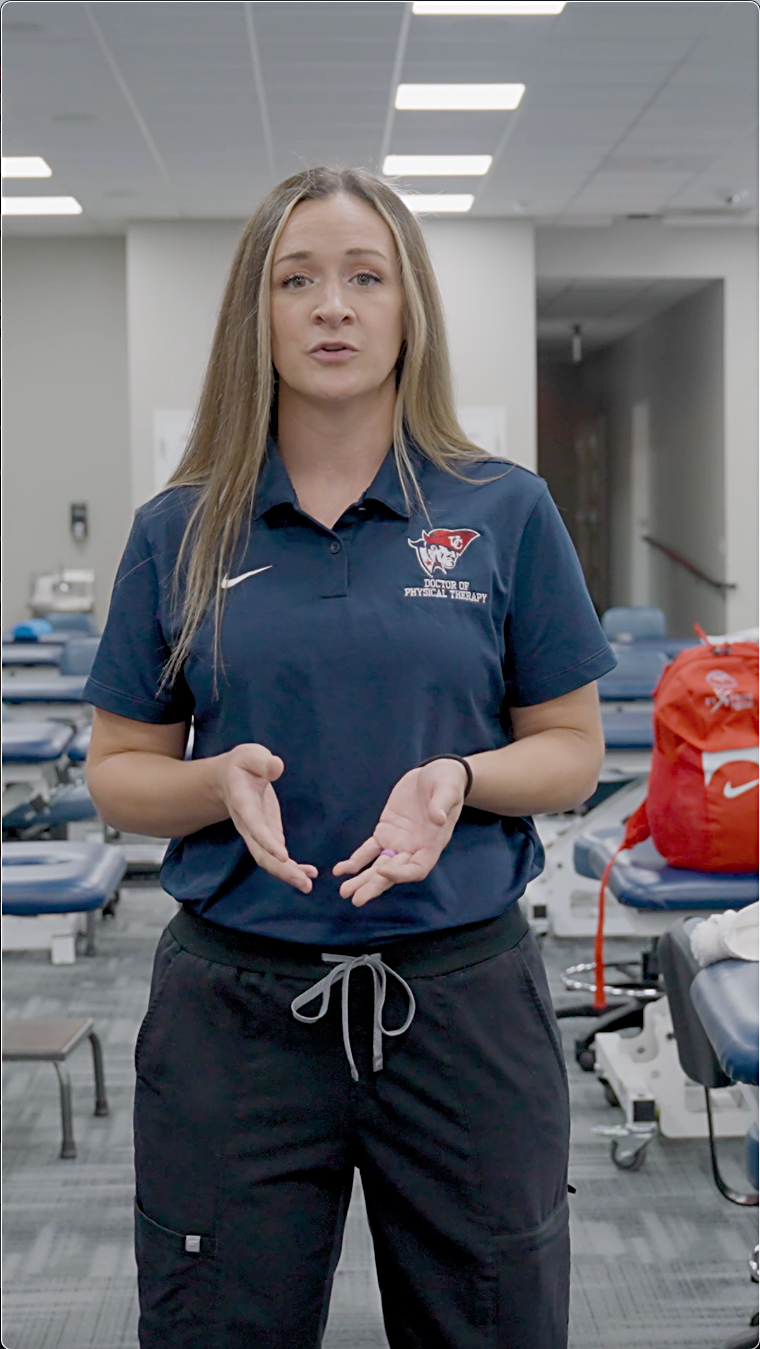
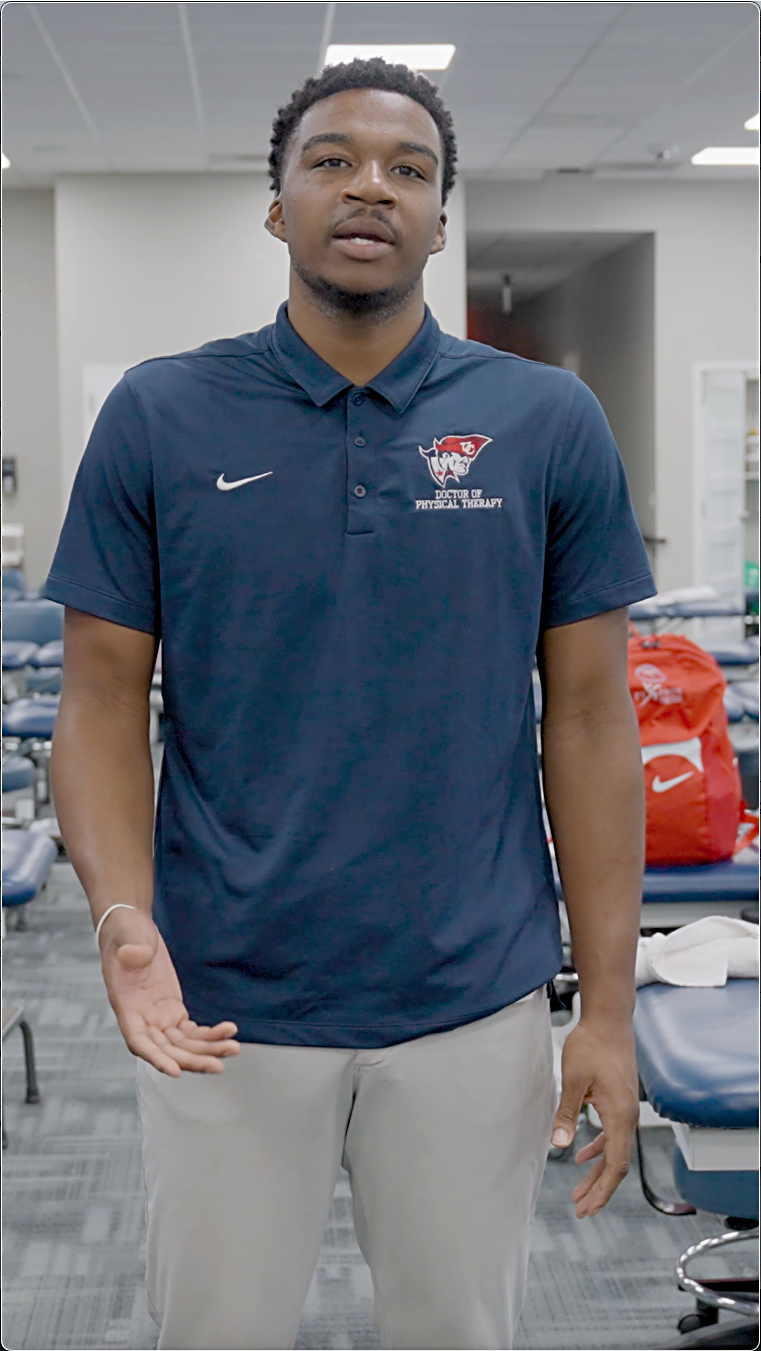
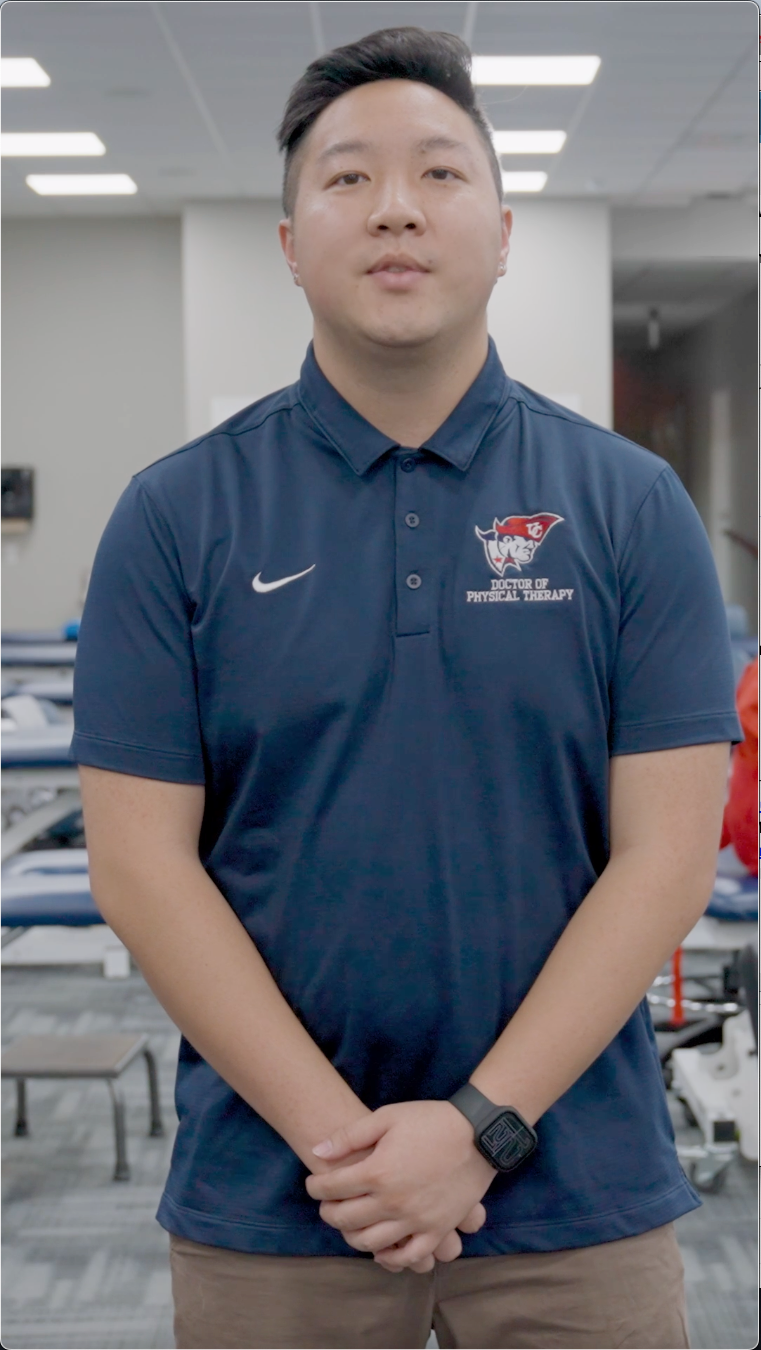
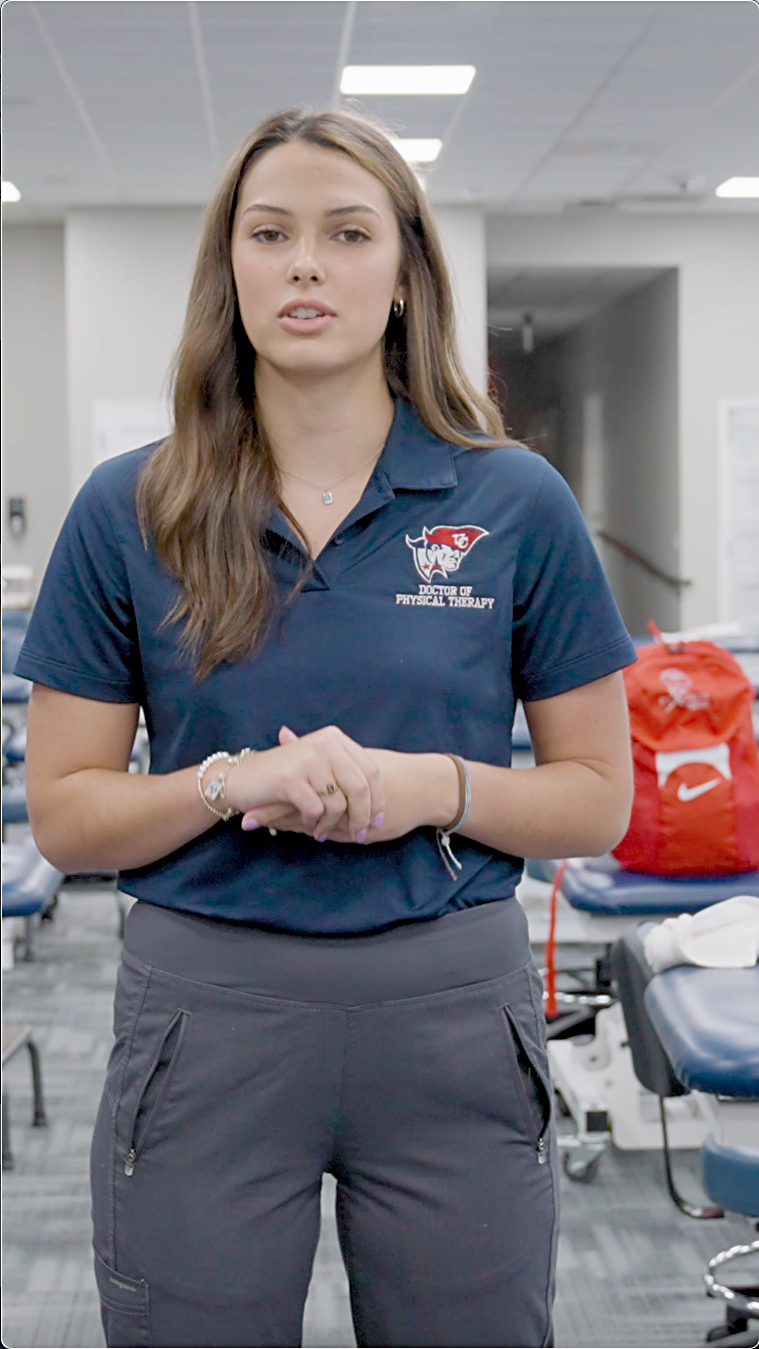
Read More About It
Learn more about physical therapy and our DPT program!
Request Information
Ready to learn more about the program?
